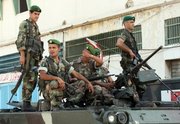 TRIPOLI, Lebanon (AFP) – Tension ran high in north Lebanon’s capital of Tripoli on Sunday even as the army was deployed in force a day after a man died in an apartment block explosion. A security official told AFP that a tobacco shop run by an Alawite was set ablaze in the mainly Sunni district of Bab al-Tebbaneh, the scene of Saturday’s blast in which 20 people were also wounded and several homes damaged. Civil defence workers put out the fire before it could spread to other businesses, the official said, declining to be named. The latest incident took place despite the deployment over the past week of army and interior ministry forces in the port city since deadly clashes between Sunnis and members of the Alawite community, an offshoot of Shiite Islam.
TRIPOLI, Lebanon (AFP) – Tension ran high in north Lebanon’s capital of Tripoli on Sunday even as the army was deployed in force a day after a man died in an apartment block explosion. A security official told AFP that a tobacco shop run by an Alawite was set ablaze in the mainly Sunni district of Bab al-Tebbaneh, the scene of Saturday’s blast in which 20 people were also wounded and several homes damaged. Civil defence workers put out the fire before it could spread to other businesses, the official said, declining to be named. The latest incident took place despite the deployment over the past week of army and interior ministry forces in the port city since deadly clashes between Sunnis and members of the Alawite community, an offshoot of Shiite Islam.
Armoured vehicles were posted at entrances to Bab al-Tebbaneh and two other densely populated districts, Jabal Mohsen and Al-Qobbe, where nine people were killed in sectarian clashes on June 22 and 23. It was still not publicly known on Sunday what caused Saturday’s explosion which killed a local resident with no known political affiliation. Almost 500 people went to the victim’s funeral which was also attended by dozens of armed militants, some wearing black headbands and chanting Koranic verses in praise of martyrdom. Lebanon’s Sunni mufti, Mohammed Rashid Qabbani, condemned the explosion as a "criminal act aimed at spreading sedition," and urged all politicians to help Prime Minister Fuad Siniora in his protracted efforts to form a new government. Residents of Bab al-Tebbaneh who support the Western-backed majority in parliament have clashed repeatedly with Alawites in the nearby Jabal Mohsen district who backs hizbollah. Later on Saturday, three grenades exploded in Bab al-Tebbaneh over a half-hour period but no one was injured and no buildings were damaged, security officials said.
And two men were wounded on Friday night in Tripoli when a grenade went off, an army spokesman said, adding that one lost a leg in the blast. The Tripoli clashes have raised fears of a nationwide security breakdown amid protracted efforts by Siniora to form a national unity cabinet since a Qatari-brokered deal in May to end an 18-month political crisis. Rival factions continue to bicker over the distribution of key portfolios in a new 30-member government. The deal was struck after at least 65 people were killed in May in sectarian clashes that saw Hezbollah stage a spectacular takeover of mainly Sunni areas of west Beirut.
TRIPOLI, Lebanon (Reuters) – A bomb killed a man and wounded 27 other people at an apartment block in Lebanon’s northern city of Tripoli on Saturday, medical and security sources said.
The blast at dawn caused heavy damage to the building in the Bab Tibbaneh area, close to the frontline of clashes on Sunday between Sunni supporters of the government and Alawite followers of the opposition. Nine people were killed in the fighting.
Rescue workers picked through debris left by the blast and took the wounded to hospital. Residents carried belongings from their badly damaged homes. The dead man was named as Mohammad Aloush, a Sunni.
Tripoli is dominated by Lebanon’s anti-Syrian, Sunni-led majority coalition. The Alawites, whose faith is an offshoot of Shi’ite Islam, have close ties to Syria and the Lebanese opposition, which is led by the Shi’ite Hezbollah group.
The Arab Democratic Party, an Alawite group, called on the security forces to bring the situation under control.
In a phone call with Prime Minister-designate Fouad Siniora, Sheikh Malek al-Shaar, the Sunni mufti of Tripoli, called for more troops to secure the city, the National News Agency reported.
A Qatari-mediated accord in May ended 18 months of political conflict between the governing coalition and the opposition.
The standoff led to a violent showdown that threatened a new civil war. Since then there have been frequent minor security incidents.
The deal which ended the political crisis included an agreement on a national unity government in which the opposition is guaranteed effective veto power. But wrangling over portfolios has held up the formation of the new cabinet.



